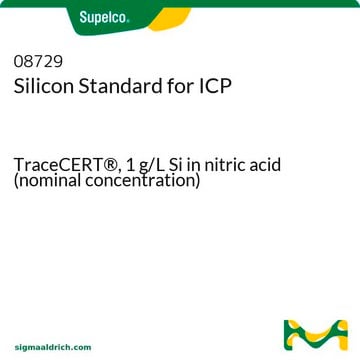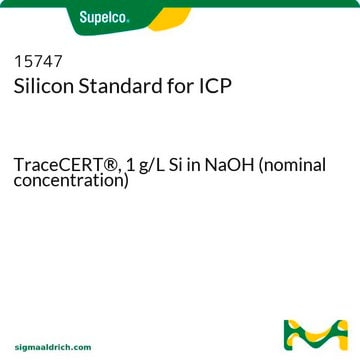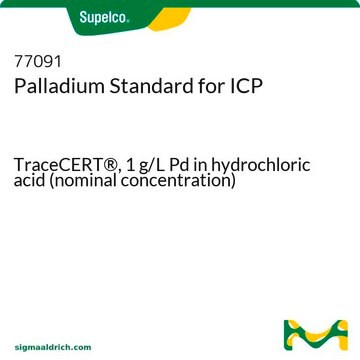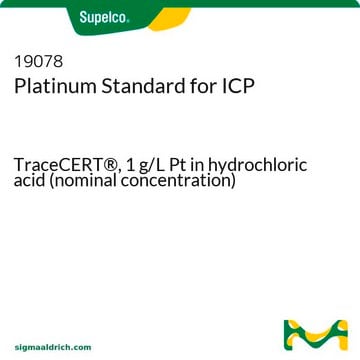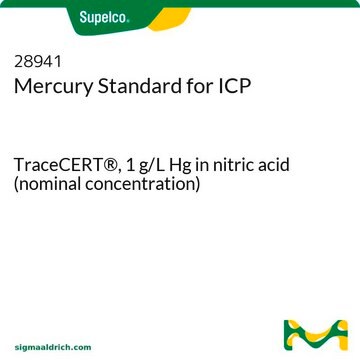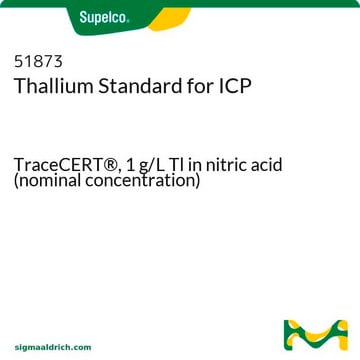1.70338
Osmium ICP standard
(NH₄)₂OsCl₆ in HCl 7% 1000 mg/l Os Certipur®
Synonym(s):
Osmium Calibration Standard for ICP
Sign Into View Organizational & Contract Pricing
All Photos(1)
About This Item
UNSPSC Code:
41116107
NACRES:
NA.24
Recommended Products
grade
certified reference material
Quality Level
product line
Certipur®
technique(s)
ICP: suitable
density
1.034 g/cm3 at 20 °C
application(s)
industrial qc
pharmaceutical
format
single component solution
storage temp.
15-25°C
Related Categories
General description
This certified reference material (CRM) is produced in accordance with ISO 17034 and characterized in accordance with ISO/IEC 17025. This CRM is traceable to SI unit kg and measured against primary material from a National Metrology Institute (NMI), e.g. NIST.
Please visit ISO certificates and Site Quality Self-Assessments to access the current certificates of accreditation.
Download your certificate at http://www.sigma-aldrich.com to view certified values, including uncertainty, date of expiry, and detailed information about trace impurities.
Please visit ISO certificates and Site Quality Self-Assessments to access the current certificates of accreditation.
Download your certificate at http://www.sigma-aldrich.com to view certified values, including uncertainty, date of expiry, and detailed information about trace impurities.
Application
The osmium ICP standard may find the below uses:
- To study the spatial distribution of isosteric osmium and ruthenium anticancer agents using laser ablation-inductively coupled plasma-mass spectrometry (LA-ICP-MS)
- Determination of osmium by inductively coupled plasma-mass spectrometry (ICP-MS) after pressure vessel digestion with nitric acid
- Development of a plasma induced vapor generation method to measure osmium in solutions by inductively coupled plasma-optical emission spectrometry (ICP-OES)
- Study of serum-binding properties of two metallodrugs by size exclusion chromatography-inductively coupled plasma-mass spectrometry (SEC-ICP-MS)
- Detection of osmium by Photochemical Vapor Generation-Inductively Coupled Plasma-Mass Spectrometry(PVG-ICP-MS)
- Inductively coupled plasma-optical emission spectrometric (ICP-OES) determination of osmium by using photooxidation vapor generation (POVG) method
Other Notes
For a complete product listing of our Certipur® range of CRMs for ICP and AAS, technical information, and example certificates please visit our ICP & AAS standards website
Legal Information
CERTIPUR is a registered trademark of Merck KGaA, Darmstadt, Germany
Signal Word
Warning
Hazard Statements
Precautionary Statements
Hazard Classifications
Met. Corr. 1
Storage Class Code
8B - Non-combustible corrosive hazardous materials
WGK
WGK 2
Flash Point(F)
Not applicable
Flash Point(C)
Not applicable
Certificates of Analysis (COA)
Search for Certificates of Analysis (COA) by entering the products Lot/Batch Number. Lot and Batch Numbers can be found on a product’s label following the words ‘Lot’ or ‘Batch’.
Already Own This Product?
Find documentation for the products that you have recently purchased in the Document Library.
Customers Also Viewed
Pharmacopeial requirements for elemental impurities: a novel approach to the trace determination of osmium by oxidative pressure vessel sample digestion and measurement using inductively coupled plasma mass spectrometry (ICP-MS) after complexation and stabilisation
Venzago C, et al.
Journal of Analytical Atomic Spectrometry, 28(7), 1125-1129 (2013)
On line vapor generation of osmium based on solution cathode glow discharge for the determination by ICP-OES
Zhu Z, et al.
Talanta, 106, 133-136 (2013)
Bioimaging of isosteric osmium and ruthenium anticancer agents by LA-ICP-MS
Klose M, et al.
Metallomics : Integrated Biometal Science, 10(3), 388-396 (2018)
Serum-binding properties of isosteric ruthenium and osmium anticancer agents elucidated by SEC-ICP-MS
Klose M, et al.
Monatshefte fur Chemie / Chemical Monthly, 149(10), 1719-1726 (2018)
High-efficiency photooxidation vapor generation of osmium for determination by inductively coupled plasma-optical emission spectrometry
Zhu Z, et al.
Journal of Analytical Atomic Spectrometry, 29(3), 506-511 (2014)
Our team of scientists has experience in all areas of research including Life Science, Material Science, Chemical Synthesis, Chromatography, Analytical and many others.
Contact Technical Service